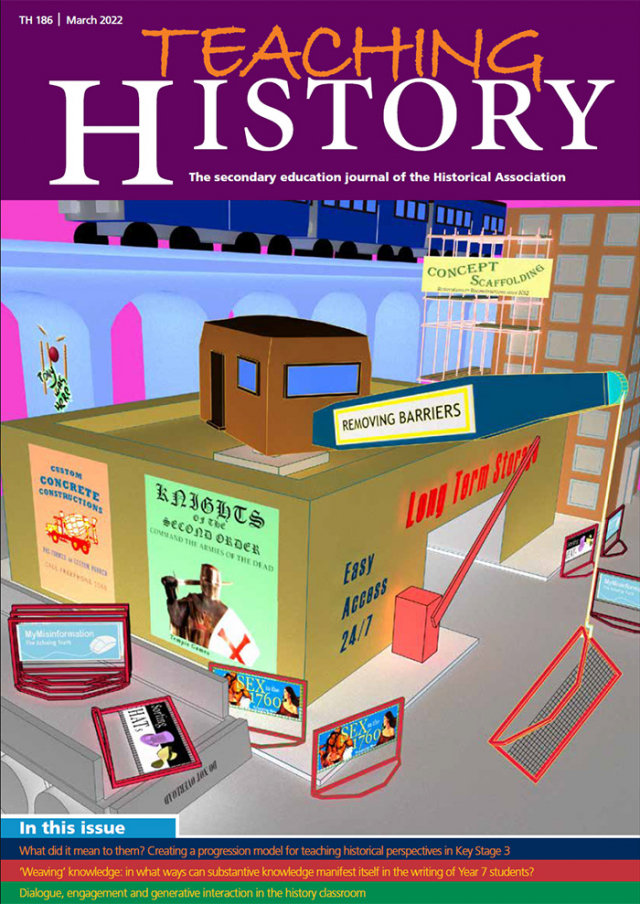Teaching History 186: Out now
The HA's journal for secondary history teachers

Editorial: Removing Barriers
Read Teaching History 186: Removing Barriers
We have in the past two years encountered a series of novel barriers to learning. Are the schools open? Are both students and teachers well enough to be there? How do you monitor learning on a Friday afternoon across a series of patchy network connections? And we have, as a profession, risen admirably to the challenge. This edition of Teaching History does not seek to engage with the particular, but hopefully temporary, barriers engendered by the pandemic. Instead, its articles identify some of the barriers which might have become endemic to history teaching – and suggest some solutions to them.
Recognising that students can struggle with expressing difficult historical concepts such as the historicity of interpretations, and that they find it difficult to see the perspective from which contemporary sources emerged, Christoph Kühberger took inspiration from his non-historian colleagues. He adapted an idea from the science-teaching community and created concept cartoons. His students were able to react to the ideas of the characters in the concept cartoons, and thereby to analyse ideas of differing merit. With difficult ideas presented succinctly to them by a cartoon character, Kühberger’s students were able to articulate and to analyse both intepretations of the past, and perspectives of it, in far more detail, and with better justification, than when those ideas were simply elicited or generated through discussion.
Jacob Olivey also wanted to engage with the perspectives of people in the past. While Kühberger adapted and designed a new type of activity to achieve this, Olivey recognised that the curriculum itself would need to change because a lack of focus on teaching about perspectives provided an insurmountable barrier for students’ progress. His article builds on the work of others in calling for a focus on perspectives in curriculum planning and insists on the construction of enquiries not only focused on perspectives, but planned with a particular progression model in mind. The article demonstrates the rapid progress made by his students when these conditions were met.
Jacqueline Vyrnwy-Pierce began the thinking behind her article with the simple observation that her Year 12 students could not read sources properly, and that this was a barrier to success in dealing with sources. She uncovered a series of reasons why her students were struggling. Some ignored unfamiliar terms, while others became fixated on them. Among those who could fully understand the sources, many did not deal with them historically. Worse, both teachers and students could tell each other what they were supposed to have done, and the students were (incorrectly) sure that they had done it. Having identified the main issues students had been facing and looking closely at what her students actually thought and did, Vyrnwy-Pierce has been able to adapt her teaching subtly to help them to engage more fully with the challenging activity of reading sources.
One problem faced by Vyrnwy-Pierce’s sixth-form students was that they did not properly understand all the words they were reading. Diane Relf found something similar with her Year 11s, whose poor vocabulary and comprehension created a substantial barrier to their learning in history. Relf, like Vyrnwy-Pierce, approached a solution through an intensive period of personal research and reflection. Her solution, however, would begin not in Year 11 but in Year 7, where she noticed that her pupils’ thin responses revealed inadequate understanding of difficult, abstract terms. These issues continued across the secondary history curriculum, thereby excluding pupils from GCSE success as well as enjoyment of history. Relf ’s solution was to build up security in abstract vocabulary by saturating pupils in richly detailed knowledge, beginning in Year 7.
Michael Bird has found that students are empowered by classroom dialogue, and suggests that failing to plan sufficient high-quality classroom dialogue is a greater barrier to progress that we might appreciate. He frames dialogue as both a social and a cognitive process. Like Relf, he is looking for a way in which rich knowledge can be shared and exemplified, with meaning made out of it: this leads him to focus carefully on dialogic learning. For Bird, this means careful planning of particular question sequences and also the creation of a general approach to doing so. Bird ends with a warning that his suggestions should not be taken as a formula or simple sequence of steps to follow. In our pedagogy it is the underpinning principles and values that really matter as we seek to help our students to overcome the barriers between them and even greater success in learning about history.

